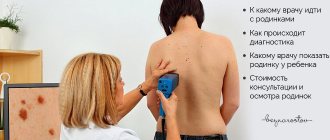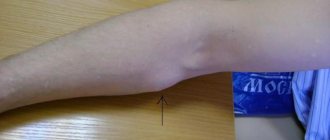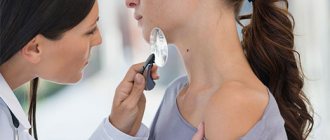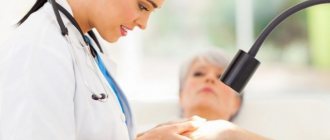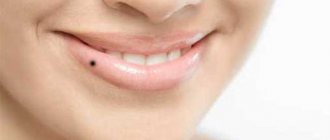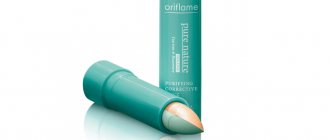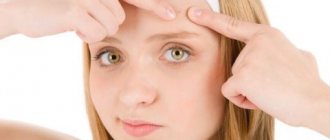The appearance of acne, especially before an important event, depresses any person. The search on Google immediately begins, what to do, what to do, where to go? Treatment of acne at home, of course, also helps and can be considered as one of the effective methods in the fight against this disease. However, the independent struggle with skin imperfections can sometimes end not as rosy as you would like. Let's talk about which doctor treats acne on the face and what he will advise you.
Let's go see a specialist
Most people are accustomed to believing that there are few good doctors left who really care about our health, and not monetary reward. “It is not beneficial for dermatologists for a patient with problem skin to be healthy!” That’s what some people say.
Like, why waste money, time and energy on visiting a dermatologist? After all, there are many ways to effectively and quickly get rid of acne on the face. Let's destroy fears and stereotypes and show that visiting a doctor when acne appears on your face is simply necessary.
Diagnosis of acne
To accurately determine the cause of the disease, you must contact a medical facility.
Diagnosis of the disease includes the following steps:
- Visual examination of the patient
- Blood analysis
- Analysis of the contents of the inflamed formation
- Examination of the digestive system.
After receiving all the necessary results, the doctor will correctly formulate a treatment method; if necessary, repeated and additional tests can be prescribed.
The doctor will determine the reasons
Only a qualified specialist can find out where the problem is coming from and prescribe treatment.
The most commonly diagnosed causes of acne include the following:
- Contamination of the sebaceous glands and ducts. The hair follicle is located in the so-called sac (follicle). This is where the sebaceous gland is located. This in turn helps hair growth. There is also a special channel, that is, it’s time. Through it, the secretion of the glands comes out. The skin is moisturized and a natural protective barrier is created. When the duct is clogged with contaminants, the fat does not come out, but remains inside. As a result, the follicle becomes inflamed, pimples appear, which spoil the entire appearance.
- Increased activity of the sebaceous glands is another significant reason why rashes occur.
- Hyperkeratosis. This is an increased accumulation of keratinized cells in the upper layer of the skin.
- Poor or insufficient hygiene . For example, acne on the forehead very often makes itself felt when it is tightly covered with bangs. Since hair has its own pollution, the risk of pore clogging increases.
- Bacterial infection , which in turn causes inflammatory processes.
- Poorly selected personal hygiene and cosmetic products.
- Climatic conditions . For example, a hot, humid climate does not always have a positive effect on our skin.
- Hormonal changes in the body . The main cause of hormonal acne in women is adolescence, pregnancy, and the time before the onset of menstruation. In addition, some medications cause hormonal imbalance. Perhaps the production of hormones is disrupted, which also leads to a malfunction of the body.
- Diseases of the digestive system . This can be directly related to our diet.
- Frequent stress . Whatever one may say, even the consequences of minor experiences bear fruit even on the cleanest face.
- A weakened immune system can also be a factor that causes a pimple to pop up.
- Ultraviolet radiation .
- Individual characteristics of the skin.
If you notice a couple of pimples on your face, then you can overcome them on your own, namely, treat them with home remedies. If acne or blackheads acquire impressive proportions, then you cannot do without a doctor who treats such ailments.
Acne on the back
Having acne is a common occurrence. Unpleasant sensations appear, and sometimes pustules appear.
Reasons for appearance
Acne on the back in men and women can appear for the following reasons:
- due to the active work of the sebaceous glands;
- hereditary predisposition;
- wearing low-quality clothes;
- frequent stress;
- puberty;
- poor nutrition;
- improper removal of acne;
- lack of vitamins;
- frequent mechanical effects on the dermis.
What can it be a symptom of and how to recognize it
The main cause of acne on the shoulders and back is the change in hormone levels during puberty in boys and girls. In this case, she becomes covered with pimples, her shoulders and face.
With syphilis, acne may occur on the back, but another characteristic sign is enlarged lymph nodes. The rashes are painful and cause discomfort.
Hives cause the appearance of red pimples that cause itching. Closed comedones are not dangerous if you start eliminating the problem in a timely manner.
What tests should I take?
If you have acne rashes, you can only get rid of it using an integrated approach. If acne occurs on the back in men and women, tests will be required to determine the causes:
- for hormones;
- on microbial flora;
- blood biochemistry;
- X-ray and ultrasound.
How to get rid of it quickly
If acne occurs, you can get rid of it in the following ways:
- improve nutrition;
- cleansing preparations;
- peeling products;
- ultraviolet irradiation;
- medicated creams and ointments.
You can get rid of acne only with an integrated approach to solving the problem.
Prices for Propeller Immuno Salicylic suspension “Boltushka” for acne
A selection of acne medications
The doctor will prescribe treatment
Remember the main truth: without establishing a clear cause for the appearance of a pimple, the effect of treatment will be only temporary. But this does not mean that you need to “give up.” It’s worth fighting (in the literal sense of the word) for perfectly clean skin so as not to aggravate the situation.
You will be presented with a list of acne remedies that will improve the appearance of the skin:
- Antibiotics . In most cases, they include tetracycline or erythromycin. This group of drugs can only be used when the pathogen is identified. If acne was caused by bacteria, then these drugs are prescribed. This method is also suitable for the treatment and prevention of acne on the hands.
- Rethionides . These are derivatives of vitamin A (retinol). When you apply them to your face, they become a real obstacle to the formation of excess dead skin cells. In addition, these products regulate sebum secretion and help accelerate regeneration. This includes retinoic acne ointment. Its advantages are that it has an anti-inflammatory effect and activates the process of skin cell renewal.
- Antiseptics (calendula tincture, chlorhexidine, salicylic acid). What are their advantages? Firstly, they prevent germs from gaining a foothold on the skin. Secondly, they become a barrier to the development of further inflammation.
- Hormonal drugs . Often, the activity of the sebaceous glands is caused by excess testosterone. The necessary medications help bring everything back to normal. However, the consequences of pimples must be dealt with in other ways. Such medications should only be prescribed by a specialist.
White pimples on back
White pimples are considered a problem among teenagers. These are formations that are caused by the accumulation of sebum in the pores and their inflammation. For this reason, suppuration occurs. This is why whiteheads appear.
Reasons for appearance
The reasons for the appearance of white pimples in a girl or guy are:
- long, constantly flowing hair;
- very tight, poor-quality clothing;
- functional ailments;
- squeezing a few pimples;
- excessive sweating;
- gynecological problems;
- food poisoning;
- psychological stress.
What can it be a symptom of and how to recognize it
If we exclude all the factors that provoke the appearance of rashes, then diseases of the gastrointestinal tract remain. In this case, nausea and vomiting, constipation or diarrhea, and general weakness may appear. In some cases, there is an increase in temperature.
If the cold is caused by a rash, then pimples will appear in one place. They are more painful and extensive. Characterized by redness.
What tests should I take?
To determine the cause, you need to undergo tests:
- blood;
- for hormones;
- to the flora.
How to get rid of it quickly
When fighting white pimples, an integrated approach to the problem helps. You can get rid of the rash using:
- masks;
- herbal baths;
- antiseptics;
- antiphlogistic agents.
Prices for GARNIER Clear Skin Active 3-in-1 with charcoal gel + scrub + face mask against blackheads
A selection of acne medications
Who to contact?
If you go to a budget medical institution, then most likely you will first go to a therapist. In a specialized clinic, the same procedure awaits you, but without the queues and tedious waiting. The following doctors usually help fight skin diseases.
Dermatologist
This is the most important doctor you need to go to if imperfections appear on your face. If you are at a loss about which doctor will help you, go to a dermatologist first - you can’t go wrong. This specialist will not only take a proper look at the pimples, but will also take an interest in your lifestyle, diet and habits.
Of course, a dermatologist treats rashes, but the first place for him is to eliminate the source of the problem itself, and not its consequences. Be prepared for the fact that you may have to take a couple of tests and visit other specialists.
Gastroenterologist
Rashes on the face can be caused by an unhealthy diet or diseases associated solely with disruption of the gastrointestinal tract. The named specialist will help you find out all this. Secondary symptoms that indicate that something is really wrong with the stomach and the help of a gastroenterologist is needed are constipation or, conversely, frequent diarrhea, plus discomfort in the abdominal area.
Due to digestive problems, pimples appear not only on the face, but also on the back, chest and other parts of our body. Many people strive to get rid of acne on their bodies, so gastroenterologists are in great demand.
Gynecologist
Girls and women should definitely visit a female specialist, since even a slight hormonal imbalance can become a source of problem skin. And if you contact us in time and correct your health, you can forget about various rashes for a long time.
Reasons for appearance
The formation of acne due to changes in hormonal levels begins under the influence of the following factors:
- Dietary changes: eating fatty and fried foods in large quantities.
- Inappropriate skin care, for example the use of skin cosmetics containing hormones.
- Diseases in the digestive system.
- A stressful condition that negatively affects the endocrine system.
- Age-related changes in the body.
- The climate is too hot and humid.
- Long-term treatment with steroid medications.
- Hereditary predisposition. Increased production of the hormone testosterone is inherited.
Even intestinal dysbiosis can provoke hormonal imbalance.
Dermatologist
A dermatologist is a doctor who will not only advise you on how to get rid of acne. He always prescribes a comprehensive examination to establish an accurate diagnosis and draws the patient’s attention to preventive measures. Most often, acne on the face and body appears for the following reasons:
Treatment of skin diseases is usually long-term and complex. It includes:
- Normalization of nutrition.
- Changing your lifestyle and daily routine.
- Rejection of bad habits.
- Use of medicinal or special cosmetics.
Since acne on the face can be associated with diseases of other organs and systems, if necessary, the dermatologist refers the patient to a consultation with related specialists.
Hormonal acne on shoulders and back
Hormonal acne can appear for various reasons, but the most important is changes in hormonal levels in the body. The appearance of rashes is influenced by hormones such as testosterone, dihydrotestosterone, dehydroepiandrosterone.
Reasons for appearance
Where do hormonal breakouts come from? The reasons are:
- inflammation of the genital organs;
- with Cushing's syndrome;
- polycystic ovary syndrome;
- an increase in the amount of male hormones produced by the woman’s body;
- taking contraceptives;
- taking steroid drugs;
- endocrine system disorders;
- psychological reasons.
What can it be a symptom of and how to recognize it
The patient will not be able to recognize the disease on his own. You will need to contact a gynecologist, dermatologist, endocrinologist. But provoking factors can be excluded. You should be less nervous and stop taking birth control and steroid drugs.
What tests should I take?
After the consultation, the following tests will be prescribed:
- blood: biochemistry and general;
- for hormones;
- gynecological smear;
- scraping
How to get rid of it quickly
The treatment of back acne in men and women should be taken seriously. Appointed:
- antibiotics;
- hormonal drugs;
- ointments and lotions;
- baths with herbs;
- sea salt.
Prices for La-Cri Stop acne Cleansing foam
A selection of acne medications
Related specialists
Doctors of other specialties can also help with the appearance of acne if the cause of the pathology is metabolic or hormonal disorders. Most often, the patient needs consultation:
- Therapist (family doctor).
- Gastroenterologist.
- Endocrinologist.
- Gynecologist.
A therapist or family doctor often becomes the first specialist to whom patients turn with complaints of skin problems. He prescribes an initial examination, including general and biochemical blood and urine tests, ultrasound. The therapist can also suggest how to change your diet to reduce the unpleasant manifestations of the disease.
Consultation with a gastroenterologist is required for concomitant diseases of the gastrointestinal tract. These may be the following pathologies:
- Steatohepatosis.
- Pancreatitis.
- Cholecystitis.
- Gastroduodenitis or peptic ulcer of the stomach and duodenum.
- Diseases of the small and large intestines.
Impaired digestion very often manifests itself as acne on the face.
Endocrinologists deal with metabolic and hormonal diseases. Thus, acne and skin problems often accompany obesity. In women, acne and hirsutism (excessive hair growth) are a consequence of polycystic ovary syndrome. In this case, endocrinologists select treatment together with gynecologists and use combined hormonal drugs.
Patients often ask: “Do I need to go to a cosmetologist with acne?”
How to take hormone tests correctly
Some doctors are skeptical about donating hormones, citing the fact that the level of these substances is variable and depends on:
- mood;
- nutrition;
- emotional state;
- phases of the menstrual cycle (in women);
- taking certain medications;
- sexual intercourse;
- physical activity and other conditions.
Therefore, the analysis shows the level of hormones at a specific moment, but after an hour it can be completely different. To minimize errors when taking tests, follow these rules:
- Blood sampling is carried out on an empty stomach in the morning;
- analysis of sex hormones in women is taken on certain days of the menstrual cycle;
- On the eve of the procedure, physical activity and sex are excluded.
Cosmetologist
A cosmetologist is a specialist who eliminates cosmetic defects, improves skin condition, and returns the face to its previous appearance. However, it is important that he has a higher medical education.
As a rule, it is dermatologists who go to work as cosmetologists in commercial clinics. In this case, the patient will receive all the necessary medical care and undergo a full examination.
But if a person without specialized education, who has only completed certain courses, calls himself a cosmetologist, you should not rely on his qualifications. He will not be able to establish the correct diagnosis and eliminate the main cause of acne on the face. Such specialists usually only offer methods of masking the problem without affecting its origin. The result is the transition of the disease to a chronic form, resistance to conventional therapy. In addition, the use of inappropriate products and procedures (scrubbing, deep peeling) can aggravate the disease or cause infectious complications.
If acne appears on your face, you need to contact a dermatologist, undergo an appropriate examination and follow all the doctor’s recommendations. Only in this case can you count on a positive result of therapy.
Today we will look at one of the most common questions from those who suffer from acne - which doctor treats acne? Of course, today most people prefer to self-medicate using the Internet. But we categorically do not recommend doing this. After all, self-medication even for acne can be dangerous.
And in order not to think about whether this or that ointment is right for you, or whether you should use this or that traditional medicine recipe, you should definitely go to the doctor. But what kind of doctor treats acne on the face? Let's try to answer this question.
How test results are used
If elevated levels of androgens are detected in women, antiandrogens are prescribed. The drugs suppress sebum production by 60–65%. In severe cases, glucocorticosteroid drugs may be recommended.
If serious disorders are detected in the body, the patient is referred to a therapist, endocrinologist or gynecologist for specialized research and diagnosis. Treatment of the underlying disease will help restore health to the skin. If tests for acne do not reveal hormonal imbalances, additional studies are carried out. Dermatologists study the microflora on the surface of the skin and test its sensitivity to antibiotics. The cause of acne may be subcutaneous demodex mites or intestinal dysbiosis.
Let's go to the doctor's appointment
You should not think that all those methods that are published on sites, including ours, can be considered a panacea. No. Each of them is just an opportunity to learn that there are many methods for treating this disease, but acne is a real disease, just like tonsillitis or, for example, bronchitis.
And the reasons for the appearance of acne on the face can be very different. And sometimes it’s very, very difficult to understand on your own why pimples pop up on your chin or forehead. This is precisely why a specialist is required who will not only determine the cause, but also make the correct diagnosis, and, of course, prescribe the only correct treatment. But which doctor should you go to for acne?
What sex hormones are tested for acne?
Hormonal imbalances occur in people of all ages, not just teenagers. They can be provoked by:
- stress;
- pathologies of internal organs;
- inflammatory processes;
- pregnancy;
- lactation;
- stopping taking oral contraceptives;
- steroid use by athletes;
- other reasons.
When diagnosing the causes of acne, it is important to get tested for steroid hormones and testosterone levels. Most often, these two substances cause acne. But disruptions in the production of estradiol, cortisol, follicle-stimulating hormone, prolactin and other hormones also affect the quality of the skin.
Steroid hormones
This group of hormones includes corticosteroids, androgenic (male) and estrogenic (female). It is worth noting that both groups of hormones are produced in both male and female bodies, but their level is different for each sex. Male hormones have a particular influence on the condition of the skin.
The mechanism of acne formation can be simplified as follows. For some reason, the production of sebum increases or its quality changes, which leads to clogging of the sebaceous ducts. The situation can be aggravated by pathogenic organisms living on the skin, failure to follow personal hygiene rules, and concomitant diseases. Male hormones directly affect the functioning of the sebaceous glands, accelerating the production of their secretion, which becomes thicker. The epidermis cannot cope with the increased load and does not have time to bring sebum to the surface.
Testosterone level
This biologically active substance is also a male sex hormone, and the mechanism of its effect on the skin is similar to those described above. It is this substance that is responsible for sexual desire, the formation of secondary sexual characteristics in boys and girls, and is responsible for aggression. The level of this substance largely depends on genetic predisposition. Therefore, if the father suffered from skin rashes in his youth, there is a high probability that his son will not suffer from this problem.
A change in testosterone levels in the body can be caused by a malfunction of the adrenal glands and pituitary gland, pregnancy, or adolescence.
Estradiol
This hormone, also called estrogen, is female and is produced in the ovaries and testicles, therefore diseases of these organs affect its synthesis. This hormone is responsible for the production of collagen, skin elasticity, its water balance, and regulation of the functions of the sebaceous glands. With its deficiency, in addition to skin rashes, wrinkles appear, the mucous membranes and skin dry out, which makes the epidermis more susceptible to environmental influences and reduces its protective properties.
Cortisol
Another popular name is stress hormone. It is what the adrenal glands synthesize in stressful situations, in moments of anger and rage. In the skin, it is responsible for wound healing and the regenerating functions of the epidermis. Its excess provokes the appearance of acne and acne.
Changes in hormonal levels negatively affect all organs of the human body. This causes disturbances in the emotional state and disruptions in the functioning of organs, including the skin. Hormone tests can determine which hormone is to blame for skin rashes and normalize the functioning of the organ that is responsible for its synthesis.
What will the doctor do?
Help with diagnostics
When answering the question of which doctor treats acne on the face, it should also be said that a specialist will definitely find out the exact cause of acne. And there are many such reasons.
- Contamination of the sebaceous glands and their ducts. Each hair follicle is contained in a sac called a follicle. Next to this pouch is the sebaceous gland. It is necessary to nourish the hair, that is, it literally helps it grow. Also, the sebaceous gland, through a pore, brings out the secretion that it produces. It helps moisturize and protect the skin. And if such a duct becomes dirty, then the secretion of the sebaceous gland cannot reach the skin and accumulates inside it. This leads to a pimple appearing on the face or other part of the body.
- Increased work of the sebaceous gland. This is also a fairly common reason why acne develops.
- Hyperkeratosis. In this case, a large number of dead cells accumulate on the surface of the skin, which, again, clog all the pores and sebaceous ducts. As a result, rashes appear.
- Poor body hygiene. For example, it has been noticed that acne on the forehead most often appears in those women who have bangs. However, they wash their hair only once a week. But hair pollution is no less dangerous for the face than your own skin pollution.
- Bacterial infection. This is a fairly common reason why acne and pimples appear on the face.
- Mistakes in choosing personal hygiene products and cosmetics.
- Living in a climate that is too humid and hot.
However, these reasons are far from the only ones that can lead to acne.
Detects diseases
Few people know that acne can cause a variety of diseases. And it is impossible to diagnose such diseases on your own. This is another reason why you should definitely visit a doctor for acne.
- Hormonal imbalance. This condition is especially typical for teenagers, pregnant women, and during menstruation. Moreover, hormonal imbalance can be caused not only by natural causes, but also by taking certain medications.
- Diseases of the stomach and intestines.
- Stressful situations for a long time.
- Weakening of the immune system.
- Prolonged exposure to the sun, or staying in a solarium.
- Individual skin characteristics.
Of course, if a couple of pimples appear on your cheek or forehead, then you can easily deal with them yourself at home. But if you suffer from acne of the third or fourth degree, then you simply cannot do without a doctor.
And under no circumstances try to squeeze out blackheads. This is what leads to the appearance of dimples on the face, as well as all kinds of scars, which will later be much more difficult to get rid of than the pimple itself.
Prescribe treatment
Until the exact cause of acne is determined, taking any medications is not recommended.
Most often, to treat acne of the third and fourth degree, as well as to lubricate single pimples, doctors prescribe antibiotics. The most popular are tetracycline and erythromycin. But the medicine can be used when the causative agent has been precisely identified, that is, the microbe or bacterium that caused the appearance of acne.
In the most severe cases, doctors may prescribe retinoids. Under no circumstances should you take them without a doctor’s prescription. Tretionin should be considered one of the most popular drugs from this group. It is available as lotion, cream or gel. it not only helps cope with inflammation, but also starts the process of skin renewal.
Antiseptics are most often folk medicines, for example, chamomile or celandine. They wash away germs from the face, cleanse the pores and carry out a good disinfection. Everyone can use them, of course, in the absence of an allergic reaction.
Hormonal drugs are prescribed to girls and women if they have elevated levels of the male hormone testosterone. It is this increase that can also cause acne to appear on the face and body.
What tests will you need to take for acne?
Acne is a common name for pimples, so testing here will have to be done on a general basis.
Among the most likely are:
- general blood analysis;
- bacteriological blood test;
- tests to check sex hormones;
- tests to check thyroid hormones.
Men and women are often prescribed different tests. Common blood tests include two types. Often, blood is additionally checked for glucose levels in order to detect diabetes mellitus in time.
Among women
The main tests for women include the determination of sex hormones - steroids, cortisol, testosterone and estradiol. They should be taken after menstruation - on days 3-6 and 20-22 of the cycle.
Before taking the test, you must give up sports, sex and strict diets. A pregnant woman should not take hormone tests, as they will not give an accurate result.
It is also not recommended to resort to treatment during lactation - it is important to wait until hormonal levels recover after pregnancy. This takes about 1.5 years.
In men
In men, dermatologists first check the functioning of the thyroid gland, since its function often malfunctions due to smoking and alcohol. The thyroid gland is checked if there is gynecomastia - breast growth in a man.
If no problems are found in this case, they begin checking for hormonal disorders, to which men are not susceptible.
Often, to prevent acne, a man is forced to quit smoking, since blood tests reveal general intoxication of the body.
Which doctor treats acne on the face and body
Which doctor should I go to with acne on my face? The first step is to see a therapist. And he will help you decide on a doctor who will help you understand your problem and prescribe medications that will help get rid of acne.
Dermatologist
A dermatologist is the primary doctor for those who want to get rid of acne. Therefore, the answer to the question of who checks acne will be a dermatologist.
You should definitely visit it. In addition, this doctor will help solve all other skin problems, and if you are in doubt about which doctor you should go to, visit a dermatologist first.
But before starting treatment, the doctor will probably ask you about your lifestyle, diet, and also write a referral for a couple of tests. You need to be prepared for this. And only after the true cause of acne has been established, you can begin the treatment prescribed by this doctor.
Subcutaneous acne on the back
Subcutaneous pimples cannot be removed normally, and pressing on them causes unpleasant pain. They usually respond poorly to treatment and end up leaving small scars after treatment.
Reasons for appearance
A subcutaneous pimple can indicate the following pathologies:
- furunculosis;
- chronic pyelonephritis;
- impaired functioning of the sebaceous glands;
- hypothermia or overheating;
- problems in the nervous system;
- skin injury;
- problems with the thyroid gland.
What can it be a symptom of and how to recognize it
Such pimples are very painful and can indicate various pathologies. If the problem lies in pyelonephritis, then symptoms characteristic of this disease may occur.
If you have problems with the thyroid gland, you may experience sudden mood swings and difficulty swallowing food.
When hypothermia occurs, subcutaneous pimples are very painful, but go away on their own over time.
What tests should I take?
To determine the reasons, it is worth visiting an endocrinologist, dermatologist, or neurologist. Tests are taken:
- for hormones;
- biochemistry and general blood test;
- Ultrasound of internal organs.
How to get rid of it quickly
It is not possible to squeeze out such pimples using the usual method. The source of inflammation is deep under the skin. This type of pimple can only be removed surgically.
Prices for Clean & Clear Advantage Gel applicator Quick effect
A selection of acne medications
Video: dermatologist's advice on how to treat acne
Gastroenterologist
Acne on the face can appear not only due to hormonal disorders or due to improper skin care, but also because there is one or another disease of the stomach or intestines.
This is what a gastroenterologist will help you find out. Other symptoms that will help you understand that the gastrointestinal tract is actually to blame for the appearance of acne include pain and discomfort in the abdomen and frequent bowel movements.
Due to various digestive problems, acne can appear not only on the face, but also on the body. This means that in this case a gastroenterologist will be able to understand the exact cause and prescribe the correct treatment for acne.
Gynecologist
This doctor will help women and girls get rid of hormonal acne, which simply cannot be cured without prescribing special medications containing hormones.
Self-prescription of hormones is unacceptable, since it is carried out only after a blood test and only on an individual basis, depending on the existing hormonal background and its disorders.
Acne is unpleasant, but not at all fatal. Today there are many medications that can help you:
Endocrinologist
This doctor will help if the cause of acne is a malfunction of the endocrine glands. Yes, yes, don’t be surprised, pimples, blackheads and other skin problems can appear for these reasons too.
To understand exactly how this or that endocrine gland works, you will have to donate blood for hormones and undergo an ultrasound. And after that you need to start taking those medications that will be prescribed by the endocrinologist.
When is a dermatologist needed for acne?
This specialist already specializes in all degrees of acne, without exception. You should contact him if the cosmetologist’s procedures did not help, or you observe signs of a more severe form of acne. And now we will tell you how to determine that such signs really exist.
At what stage of acne should you go to a dermatologist?
The third and fourth stages are the most severe - they are difficult to treat and cause a lot of discomfort to their carrier. At the third stage, acne affects all areas of the face, without exception. It becomes more intense - it is observed that several pimples merge into painful dark pink spots filled with liquid pus.
This type of acne is also called conglobate acne. Inflammatory processes on the skin do not stop, and acne hurts and itches. And the final stage will be the fourth, at which surgical intervention is often resorted to.
At the last stage, the acne practically merges into one whole. There is practically no living space left on the affected skin - in areas with such acne, the skin causes severe pain and itching. In fact, during this period, acne becomes similar to multiple boils. A ripe pimple breaks out literally with light pressure.
Our readers write
How I got rid of acne
My name is Elena and I am 20 years old. My first pimple appeared at the age of 14 and since then I have learned all the delights of this disease. But for a year now there hasn’t been a single pimple on my face. And the whole secret lies in the unique drug Aknelocin.
If you had seen my face 5 years ago, you would have been simply horrified! There were all kinds of pimples - big and small, they were everywhere. I was ashamed to go out. I was treated with available folk methods - chamomile and celandine. They didn't help as much as I would have liked.
I developed complexes, my mother tried to help me, but the acne didn’t want to go away. It seems that I have already come to terms with my problem. And I even learned to live with acne.
But one day a friend of my mother came to visit us. And seeing the terrible state of my face, I was very surprised that we still haven’t bought an amazing product. She gave us its name - and that’s how I learned about Acnelocin. I read reviews about it and decided to try it.
We were able to purchase the product without any hassle, and at an attractive price. And most importantly, after 2 weeks of daily use, I began to notice that my acne began to not only decrease in size, but also disappear.
As a result, by the end of the full course of treatment there was not a single pimple left on my face. And now for a whole year I don’t know what acne is.
Now I advise all young people with problem skin to use Acnelocin. And even though many people believe that acne can be cured with iodine or brilliant green, only this amazing medicine helped me!
How I got rid of age spots on my face
Age spots are very unpleasant. But until I was 23 years old, I didn’t even know what it was. It all started with hormonal changes in the body, which happens to every woman during pregnancy and after childbirth.
My face looked terrible - the pigment spots were large, occupying almost the entire forehead and cheeks. I simply could not look at myself in the mirror.
Caring for a small child somehow brightened up my days. But when my daughter grew up a little, I finally decided to regain my previous appearance. And I realized that the first thing I needed to do was get rid of age spots.
And then, quite by chance, I came across an interesting article on the Internet about a product called Inblanc. This whitening milk could be ordered right here, which is what I did.
I received my purchase quickly and started working on the same day. I used whitening milk 3 to 5 times a day and was able to see the first results in just a week. The pigment spots on the forehead became lighter, but on the cheeks did not respond to treatment.
But I didn’t give up and used Inblanc whitening milk for the full course of treatment. And you know - everything passed! Literally after 3 weeks from the start of use, the spots began to simply disappear. And then one fine moment in the evening there was still the last speck. And in the morning he was no longer there!
Whitening milk literally brought me back to life. Now I like my face, and today I recommended Inblanc whitening milk to my pregnant friend - an ugly pigment spot appeared on her face, which greatly spoiled her beauty.
How Inblanc changed my life
Hi all! My name is Marina, I am 23 years old, and I am the mother of a charming daughter. But my motherhood is overshadowed by one unpleasant circumstance - every day in the mirror I see ugly pigment spots on my cheeks and forehead.
I tried everything I could to get them out! I tried both celandine and chamomile, and even signed up for chemical peeling, but thought better of it in time.
And then somehow my husband, quite by accident, came across this amazing article on the Internet, which described milk for the treatment of age spots. And knowing about my problem, without saying anything, I ordered this product.
I received my unexpected gift literally a week later. And on the very first day I smeared the hated spot on my forehead and a couple of spots on my cheeks 5 times a day. I don't think it was much - the hyperpigmentation on my face was too strong.
This went on for a week. And literally on the 10th day from the start of use, it began to seem to me that my spots began to lighten. I immediately questioned my husband, and he confirmed my joy. And to accurately confirm my guess, I went to my friend. And do you know what she said?
- What happened to your spots? They are no longer so noticeable, my dear! Let me try to cure my freckles with this drug!
I showed her website, where I first read about Inblank after my husband ordered it for me. And then we placed an order with her here.
Surprisingly, Inblanc has made my motherhood even more wonderful, and now I am actually happy!
Types of acne
Depending on the individual characteristics of the person and the factors that cause inflammation, acne can be of various types:
- Reds
- Blackheads
- Subcutaneous
- Purulent
Note! Depending on the type of inflammation, various treatment methods may be prescribed.
Reds
This type of acne is one of the most common types of inflammatory processes in the back and shoulders.
- Most often, the rash covers a large area of skin and has an unpleasant itching sensation.
- Initially, the defect appears in the form of a small inflamed tubercle, on which a white dot appears after some time.
- Depending on the time of year, inflammation tends to decrease and increase.
- The greatest number of such inflammatory processes occurs in winter.
- If scratched, such inflammatory formations can turn into small wounds, which, after removal, can leave marks in the form of scars.
Blackheads
The formation of blackheads on the back occurs due to clogging of the pores with subcutaneous fat, which contains particles of dust and other types of pollution.
- When a pore becomes clogged, a mixture of dirt and oil forms a plug.
- Inside the pore itself, harmful microbes multiply, which leads to cell expansion and inflammation.
- The main reasons for this defect are poor nutrition, lack of personal hygiene, and adolescence.
- To eliminate such diseases of the epidermis, it is necessary to carry out treatment in several approaches: cleansing, antibacterial care, skin restoration.
Subcutaneous
Subcutaneous acne is one of the most severe types of inflammation that is difficult to treat.
- In most cases, after treatment of inflammatory formations, marks in the form of scars and spots remain on the body.
- Such defects occur due to clogging of the sebaceous glands, which go deep into the layers of the epidermis.
- For treatment, special compresses are most often prescribed, which accelerate the maturation of the pimple, and bodyags, which have a resolving effect on subcutaneous formations.
Purulent
Treatment of purulent acne should be carried out only by cosmetologists, since self-treatment can lead to the spread of infection throughout the body, and these types of formations cannot be squeezed out.
- Externally, the formations look like compactions around which the skin swells and purulent protrusions in the center of the compaction.
- After maturation, such seals leak out on their own and require treatment with a disinfectant solution.
- When treating such inflammatory processes, it is most often necessary to take an analysis of the contents of the abscess and blood, after which the doctor will be able to identify the cause of the spread of inflammation and prescribe appropriate treatment.
Which doctor should you go to for acne: a cosmetologist or a dermatologist?
A cosmetologist or dermatologist for pimples and acne is an eternal question that worries everyone who has decided to take skin health seriously.
Some believe that with a problem face you should contact cosmetologists, others prefer to besiege dermatologists’ offices, and others rely solely on their own efforts in the fight against acne.
But in such situations you need to act for sure. Therefore, in this article we will tell you who to contact with acne.
A little about acne and pimples
It’s worth clarifying right away that acne is a completely normal phenomenon, especially during adolescence or during times of strong hormonal activity. During such periods of life, this reaction of the body is quite normal, and you just need to wait for the hormonal levels to normalize for the skin to return to normal.
But if acne does not disappear even with the onset of adulthood, termination of pregnancy, treatment with hormonal drugs or menstruation, you should start to worry. After all, this may indicate serious disturbances in the functioning of the body, an extremely incorrect diet or lifestyle in general.
But it is quite difficult to independently determine the cause of acne, since there are many factors that we simply do not want to take into account. For example, on our website a whole section , but even after studying it we cannot speak with confidence about the reasons. And even more so, we cannot prescribe the correct course of treatment for ourselves.
There are a lot of ways, and not all of them work. That is why it is worth first going to a specialist who understands the issue.
The only problem is that a person suffering from acne on his face does not always know which specialist can help him. Which doctor should I go to with acne - a cosmetologist or a dermatologist? Unclear. After all, at first glance, it seems that these specialists are doing the same thing - helping people with problem skin.
Which doctor should you go to for acne: a cosmetologist or a dermatologist?
First, let's answer the most common question: cosmetologist or dermatologist - what is the difference? It exists, and it is very significant. The fact is that the cosmetologist’s task is to eliminate existing aesthetic defects on your skin without digging too deeply into the problem.
At the same time, a dermatologist is not called a doctor for nothing. This is a certified specialist with a medical education. When you come to see him with a specific problem or question, he goes over the issues of external skin care only superficially, determining what you are doing correctly and what is not.
What is the difference between a cosmetologist and a dermatologist?
That is, he can prescribe the most suitable skin care products for you and explain all the intricacies of daily procedures. In general, he will tell you and show you what to do to prevent pimples from appearing due to external factors, such as incorrectly selected cosmetics, poor care, or imbalanced skin.
This is a specialist with a real certificate, but still not a doctor. You should contact a cosmetologist if you want to maintain a pleasant skin appearance, choose good products for yourself and develop an ideal daily care routine. A dermatologist is a completely different matter.
His main job is to identify the underlying cause of acne on the skin. Find out why it did not disappear with the end of adolescence.
With the help of examinations and all the necessary tests, find out where exactly the body “fails.” After all, as we know, serious acne does not just appear because you ate one extra burger yesterday. The problem always lies much deeper.
For example, if you notice that acne begins to appear more intensely after eating junk food, then the doctor will send you for tests and an examination of the gastrointestinal tract. If the hormonal balance is disturbed, you will have to undergo gynecological examinations and take all the necessary smears.
Simply put, a dermatologist understands exactly how problems in the functioning of the body affect our skin and is able to help with it. He will be able to diagnose the possible causes of epidermal disease and provide their correct treatment, taking into account the individual characteristics of your body.
In addition, he will prescribe you a really good and effective acne medicine.
So cosmetologist or dermatologist?
If you are asked whether you are a cosmetologist or a dermatologist for acne, then you can say this. A cosmetologist will make you beautiful, and a dermatologist will cure you.
Each of these specialists has their own specific work that helps to achieve solutions to your problems. They use different equipment, tools, drugs, for example, cosmetic or medical ones.
However, the ultimate goal of both the cosmetologist and the dermatologist is common: to make your skin clear.
When do you need a cosmetologist for acne?
The most common practice of beauty salons is to serve clients with early stages of acne. If your disease shows the first symptoms or is in a mild stage, a cosmetologist will cope with it through medicinal cosmetics.
You may ask: what are these stages, and how can I tell if I have a mild one? We have already written about this in detail in this article , supplementing useful information with visual photos, so we recommend that you read it. But let’s explain briefly.
At what degree of acne can you contact a cosmetologist?
There are only 4 degrees of acne, and each of them is characterized by a special intensity and density of acne coverage of the skin. We are interested in the first 2 degrees, which are conventionally considered mild. At the first stage, in the oiliest areas of the skin (on the chin, forehead and wings of the nose), black dots and small pink pimples appear with suppuration inside.
So far, acne does not cause any discomfort, except for aesthetic reasons - acne does not hurt or itch. In the second stage, there are more acne. They are already spreading to other areas of the face and body.
Acne covers the cheeks, and sometimes the back, shoulders and chest. The appearance of pimples of a pale pink hue and medium size is typical. They are hidden under the skin, making it impossible to squeeze them out. These acne pains when pressed and itch before breaking out.
Most often, such problems occur in adolescents and young adults, because the pubertal and post-pubertal periods are the peak of the body’s hormonal activity, and this is the main cause of pimples and acne. If you notice signs of the first or second stage of acne, then you can go to a cosmetologist.
What to do if the cosmetologist does not help?
In this case, properly selected care and procedures can significantly improve the condition of the skin. However, if the work of a cosmetologist did not produce any results (or they simply did not completely satisfy you), but at the same time you are confident in the competence of the specialist, then it is worth visiting a dermatologist. After all, perhaps the main cause of your acne is internal problems of the body. And this is already serious.
When is a dermatologist needed for acne?
This specialist already specializes in all degrees of acne, without exception. You should contact him if the cosmetologist’s procedures did not help, or you observe signs of a more severe form of acne. And now we will tell you how to determine that such signs really exist.
At what stage of acne should you go to a dermatologist?
The third and fourth stages are the most severe - they are difficult to treat and cause a lot of discomfort to their carrier. At the third stage, acne affects all areas of the face, without exception. It becomes more intense - it is observed that several pimples merge into painful dark pink spots filled with liquid pus.
This type of acne is also called conglobate acne. Inflammatory processes on the skin do not stop, and acne hurts and itches. And the final stage will be the fourth, at which surgical intervention is often resorted to.
At the last stage, the acne practically merges into one whole. There is practically no living space left on the affected skin - in areas with such acne, the skin causes severe pain and itching. In fact, during this period, acne becomes similar to multiple boils. A ripe pimple breaks out literally with light pressure.
